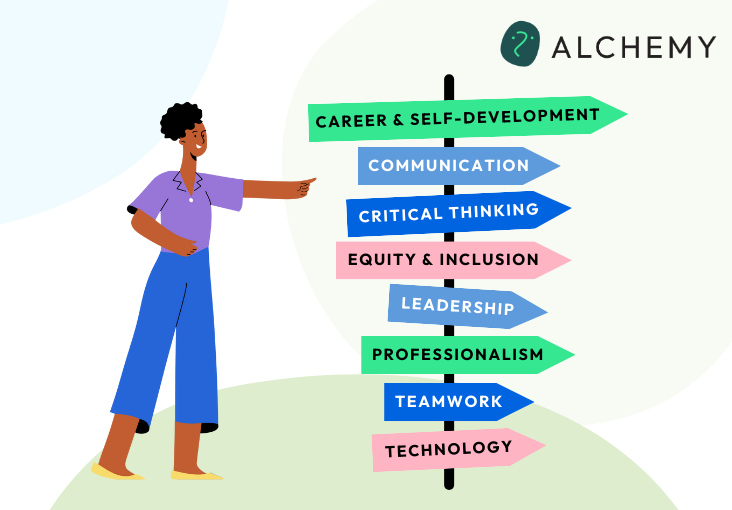Article
Evolving Higher Education: How AI Brings Greater Efficiency to Campus

INTRODUCTION
Artificial Intelligence (AI) is reshaping industries across the globe, and its influence is rapidly extending into higher education. This transformation isn’t about replacing the human element, but rather enhancing workplace efficiencies to enable going deeper with core elements of the institutional mission. The objective is to offload tasks that require less important cognitive function and allow educators, staff, and leadership to focus on the aspects of their roles that truly matter. In this blog post, we’ll explore how AI can ultimately enable institutions to focus more of their energy on providing inclusive and engaged learning experiences and meeting the evolving needs of today’s students.
Enhancing Academic Efficiency with AI
In this ever-evolving educational landscape, AI can play a pivotal role in streamlining academic processes, creating a more productive and student-centered environment.
Streamlining Faculty Responsibilities
- AI-driven Personalized Learning: Tailoring educational content to individual student needs helps faculty manage diverse learning requirements more effectively, ultimately improving the learning experience.
- Automated Assessment Systems: AI-powered tools can dramatically reduce the manual workload for educators on many low-stakes assessment types, freeing up their time for more meaningful tasks like student interaction and lesson planning.
- Advanced Research Assistance: AI can assist academics with data analysis, keeping them updated with relevant publications, and helping avoid research duplication, all of which accelerate the research process.
Optimizing Student Services
- Predictive Analytics for Student Success: AI can identify at-risk students by analyzing their performance data, aiding in the development of targeted intervention strategies, ultimately improving student success rates.
- AI Chatbots for Common Student Queries: Implementing 24/7 virtual assistants to answer student questions related to courses, support services, campus facilities, etc., ensures that students have access to the information they need when they need it. By eliminating the need to answer common transactional questions, time can be reallocated to more meaningful student engagement.
- Streamlining Administrative Tasks: Automating scheduling, responsive advising pathways/scenarios, and student records management minimizes administrative bottlenecks, allowing staff to focus on more strategic tasks.
Empowering Administrative Staff and Leadership
Administrative staff and leadership in higher education institutions are also experiencing the transformative power of AI.
Strategic Decision-Making with AI
- Data-Driven Insights for Leadership: AI can efficiently analyze trends, prepare reports, and provide data-driven insights that empower leadership to make strategic decisions in an informed and timely manner.
- Enhancing Recruitment Strategies: Leveraging AI to optimize admission processes, personalize marketing communications, and predict enrollment trends can help institutions adapt to changing demographics and more effectively drive enrollment. The reduced time in tasks such as scheduling also allows admissions counselors to dedicate more time to engaging with prospective students and families.
Efficient Campus Management
- AI in Facility Management: Smart systems powered by AI can optimize energy use, predict maintenance needs, and efficiently manage resources within campus facilities, reducing operational costs.
- Automating Routine Administrative Work: AI can take over repetitive tasks like data entry, schedule management, and form submissions, freeing staff to engage in more critical, creative, and human-centric tasks.
Building a Collaborative Campus Environment
- AI-Enhanced Communication Systems: Utilizing AI to manage communications more efficiently ensures vital information reaches all relevant parties, fostering awareness, collaboration and engagement.
- Synthesizing Feedback: AI tools can be employed to gather and analyze feedback from the campus community to help shape more efficient and responsive administrative approaches.
Overcoming Challenges and Ethical Considerations
Implementing AI on campus is not without its challenges. As institutions transition to AI-powered systems, they must navigate a learning curve. Preparing staff and faculty through intentional training and support is essential to a successful implementation. Additionally, financial challenges and infrastructural constraints may pose barriers, and institutions must allocate resources strategically.
Ensuring data privacy is also a top priority when implementing AI in higher education. Institutions must safeguard personal information while harnessing data for AI. AI algorithms must be carefully designed to avoid bias and ensure fairness in decision-making processes, upholding equity and inclusivity standards.
CONCLUSION
The potential of AI to revolutionize efficiency in higher education environments is vast. It is not about replacing humans, but rather enhancing their capabilities and focusing their efforts on what truly matters. Higher education professionals should be informed and empowered to embrace these technological advancements, understanding that strategic planning that incorporates AI tools is the key to successful integration. The future of AI in higher education is promising, and continual learning and adaptation are crucial to stay ahead in this ever-evolving landscape. By leveraging AI, campuses can become more efficient, responsive, and better equipped to meet the evolving needs of students and staff in the 21st century.



